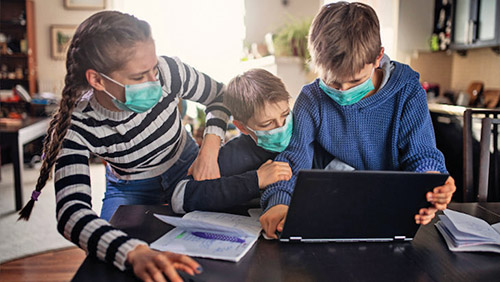
The coronavirus has caused a major shift in the way we’re educating our children. Schools quickly converted to Zoom-style learning in the comfort of your homes. In the first week of April, Reuters reported that Zoom’s daily users ballooned to more than 200 million, from a previous maximum total of 10 million. This shift propelled parents into action. Adjustments ran from figuring out how to set up proper learning space at home for each of the kids, to buying extra tablets or computers to allow multiple children to learn simultaneously. For some parents, this has worked, and for others it has caused lots of stress and has been a disaster.
But there is an even more important aspect of the education process at home that has also undergone a major change. And it’s one that is commonly overlooked.
The fact that children are home all day means that they are around their parents more than ever before. The Hebrew word for one who influences is mashpia. The word derives from the root shipua, meaning incline. The effect of the influencer is comparable to water falling from a steep roof to the ground below—i.e., it is automatic, rather than the intended consequences of specific words or deeds.
If the current situation results in our children learning less material than they would have in a normal school setting, that’s okay. They have the rest of their lives to receive these pieces of information. But the influence of parents is much different. Children learn patterns of behavior from observing their parents, especially how they interact with one another. How to disagree, have respect, and have healthy relationships are being learned through watching your interactions with your spouse. If your conduct and interactions during these stressful times aren’t smooth, the lessons absorbed by the children will be negative and very difficult to undo in the future. On the other hand, if you navigate the storm with calm, your children will learn the important tools needed to deal with future challenges that they may have in life.
Being around our kids in a more intense fashion than usual is an opportunity to instill in them the most important lessons of life. Here are a few:
If you want to teach your children to respect you, there must be a spirit of respect in the home.
It’s okay, and even healthy, for children to see their parents disagree. But the disagreement has to be with love and positivity. Witnessing such an interaction teaches the child that it’s important to validate and respect another’s opinion, and it’s okay to disagree in a loving way. If you want to teach your children to respect you, there must be a spirit of respect in the home. Seeing how you respect another’s opinion will bring them to respect you even more.
However, if children hear their parents berate each other and show resentment towards one another, they will view this as the prescription for problem solving.
Observing how you interact with your spouse will also prepare them properly for their own marriages in the future. A successful marriage requires the couple to be flexible, caring, affectionate, and sympathetic to one another. The best way to nurture these character traits in our children is to continually set an example of these traits for them to observe and absorb, day after day.
For example, when we tell our kids, “I’m doing this because I know it makes your mother/father happy,” or when they see you sacrificing time and effort (with a smile) in order to make your wife/husband happy, you’ve provided a strong lesson, one far more valuable than any Zoom class.
Frequently speaking to your children about all the wonderful things your spouse does for the family is also crucial. Teach them how to highlight specific areas in which your spouse is helping them and encourage them to articulate and express their appreciation for those things. (A card- writing project where the children put these feelings into a concrete form is an easy way to teach your children the art of gratitude.)
We’re living during a time of opportunity. Reflecting on the power our daily impact has on our children, and refining our efforts, may be our family’s greatest blessing.
Rabbi Dovid Rosman is the director of Yeshivat Aish HaTorah and a rebbe in the Advanced Beit Midrash program. He previously studied in Jerusalem’s Mir Yeshiva and also studied under the tutelage of Rabbi Tzvi Kushelefsky. He received his B.A. and rabbinic ordination from Yeshiva University. He is also a freelance writer with articles in Hamodia, Mishpacha and other publications. Some of his lectures can be found on yutorah.org and www.torahanytime.com. He has also written a book about marriage, Your Wife, Your Self: A Husband’s Guide to Shalom Bayis.









